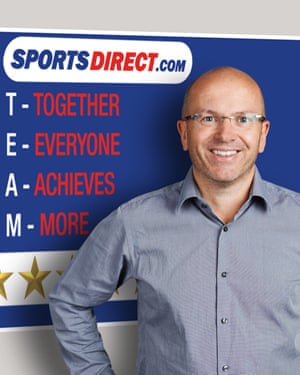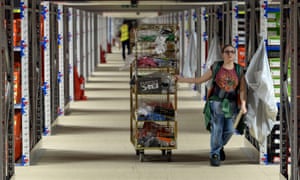Mike Ashley and the board of Sports Direct face a showdown with shareholders this week over a host of problems – including treatment of its employees, corporate governance and ailing performance.
Investors in the controversial firm, which has faced months of pressure over working conditions for staff, get their chance to quiz directors at Sports Direct’s annual meeting in Shirebrook, Derbyshire, on Wednesday.
Ashley, who founded the company and still owns 55%, is the executive deputy chairman and will attend but in the past he has stayed quiet, leaving the difficult job of answering questions to chairman Keith Hellawell and chief executive Dave Forsey.
Thousands of Sports Direct warehouse workers are to receive back pay totalling about £1m after the retailer admitted breaking the law by not paying the national minimum wage. And the company and its employment agencies are facing fines of up to £2m imposed by the Department for Business, Energy and Industrial Strategy (BEIS) after they were found to have been underpaying workers for four years.
So, after a tumultuous year for the retailer, these are the questions that investors should ask at the AGM.
What improvements have been made to working conditions in the main warehouse in Shirebrook?
MPs on the business, innovation and skills committee claimed that Ashley was running Sports Direct like a “Victorian workhouse”. Ashley himself told the parliamentary committee in June that an internal review of Sports Direct’s working practices uncovered “unpleasant surprises”. Shareholders need to clarify what improvements have been made since then, other than Sports Direct increasing pay for staff and agreeing to pay warehouse workers back pay after a Guardian investigation exposed that it was effectively not paying the national minimum wage. RPC, the law firm, will this week publish its report on Ashley’s review of working conditions, but leading shareholders believe this is not independent because RPC is a regular adviser to Sports Direct. The company should provide indisputable evidence about the changes it has made.
What’s the status of the HM Revenue & Customs inquiry into Sports Direct?
Even though Sports Direct has reached an agreement with HMRC and trade unions about back pay for staff in the Shirebrook warehouse, HMRC is still understood to be investigating the retailer about whether workers in its warehouse and shops were paid less than the national minimum wage. The threat of a multimillion pound fine hangs over the company.
Will Keith Hellawell resign as chairman if a majority of independent shareholders fail to support him?
Sports Direct is facing a major rebellion at its annual meeting, with institutional directors threatening to vote against the re-election of former policeman Keith Hellawell as chairman. If a majority of independent shareholders vote against him, Ashley could use his 55% stake to protect Hellawell at a second vote. However, surely Hellawell’s position will be untenable if there is a major rebellion. The chairman is supposed to represent all shareholders and keep a company’s management in check.

Who is conducting the review of the company’s board and do you pledge to publish and implement its findings?
Sports Direct announced last month that an “external evaluation” of its board will take place later this year. It is a minimum requirement of any FTSE company to conduct a review every three years but, given the concerns about the dominance of Ashley on the Sports Direct board, the suitability of Hellawell as chairman, and the lack of a permanent finance director, investors should push for information on who will conduct this evaluation and ensure that its recommendations are implemented.
When will you appoint a permanent finance director?
Sports Direct has not had a permanent finance director since December 2013, when Bob Mellors stepped down for health reasons. Matt Pearson is filling the role on an interim basis, but it is unprecedented for a listed company to go so long without a permanent finance director. Major shareholders believe this is another sign of the slack corporate governance at Sports Direct and the power that Ashley wields over the business.
Why is the delivery of online orders overseas being managed from a house in Cleethorpes?
The latest controversy to engulf Sports Direct was the news that it pays an obscure company, owned by Mike Ashley’s brother, to deliver online orders outside the UK. Barlin Delivery Limited is owned by John Ashley and registered to a detached house in Lincolnshire. It makes a profit of £300,000 a year from the arrangement with Sports Direct, although it is not clear if this is after salaries and dividends, and uses DHL to actually deliver goods. Sports Direct needs to explain why this arrangement with John Ashley is the most efficient way to manage orders, how much has been paid to Barlin, and why this was not disclosed as a related-party transaction in its accounts.
How would you describe your relationship with suppliers, particularly Adidas?
Amid the controversy about working practices and corporate governance, Sports Direct is also finding trading tough in Britain and Europe. One of the reasons for this is that major suppliers are not providing the company with their most popular products, choosing to go through their own shops or Sports Direct’s rival, JD, instead. For example, Adidas does not provide Sports Direct with its replica football kits, including Manchester United’s, nor its latest trainers.
Are you finding it more difficult to attract and keep staff?
Staff turnover at Sports Direct rose by more than three percentage points last year to 22%, according to its annual report. The figure is almost three times the average turnover rate of 8% for UK employers, but is lower than other retailers. Two concerns spring out from with this statistic – is Sports Direct losing its most talented shop workers and warehouse staff as a result of poor working conditions, and is the company struggling to attract new talent? This could explain why the retailer has not replaced Hellawell or hired a permanent finance director.
Is Mike Ashley still committed to Sports Direct?
Sports Direct stated in its annual results that Ashley had told the board he had no plans to buy the shares in the company that he does not hold and take it private. However, the annual meeting is a chance for the man himself to outline his plans in person. Sports Direct shares are trading at around 325p, way down on their 2014 peak of 922p and only just above the 300p the firm floated at in 2007. Ashley could well be tempted to take the company off the stock market, which would end the criticism from City institutions and other shareholders. Alternatively, he could sell more of his shares, even reducing his holding below 50%. After all, Ashley told MPs that Sports Direct may have become too big for him and the tycoon has stepped back from day-to-day control of Newcastle United, the football club he owns.
OPEN DAY AT HEADQUARTERS

Sports Direct is opening its doors to members of the public on the day of the annual meeting.
Usually only shareholders, and occasionally journalists, are invited to attend annual meetings, but Sports Direct says it wants to enable the board, including Mike Ashley, to “engage with as many people as possible in an open discussion about the business”.
The invitation will allow critics of the company, such as MPs and trade unions, to attend. The day will begin at 11am at the annual meeting, before there is a tour of Sports Direct’s headquarters in Shirebrook, Derbyshire, a presentation, and a question-and-answer session.
However, guests and questions had to be pre-registered, so it remains to be seen whether Sports Direct is prepared to tackle difficult questions from its most ardent critics.



